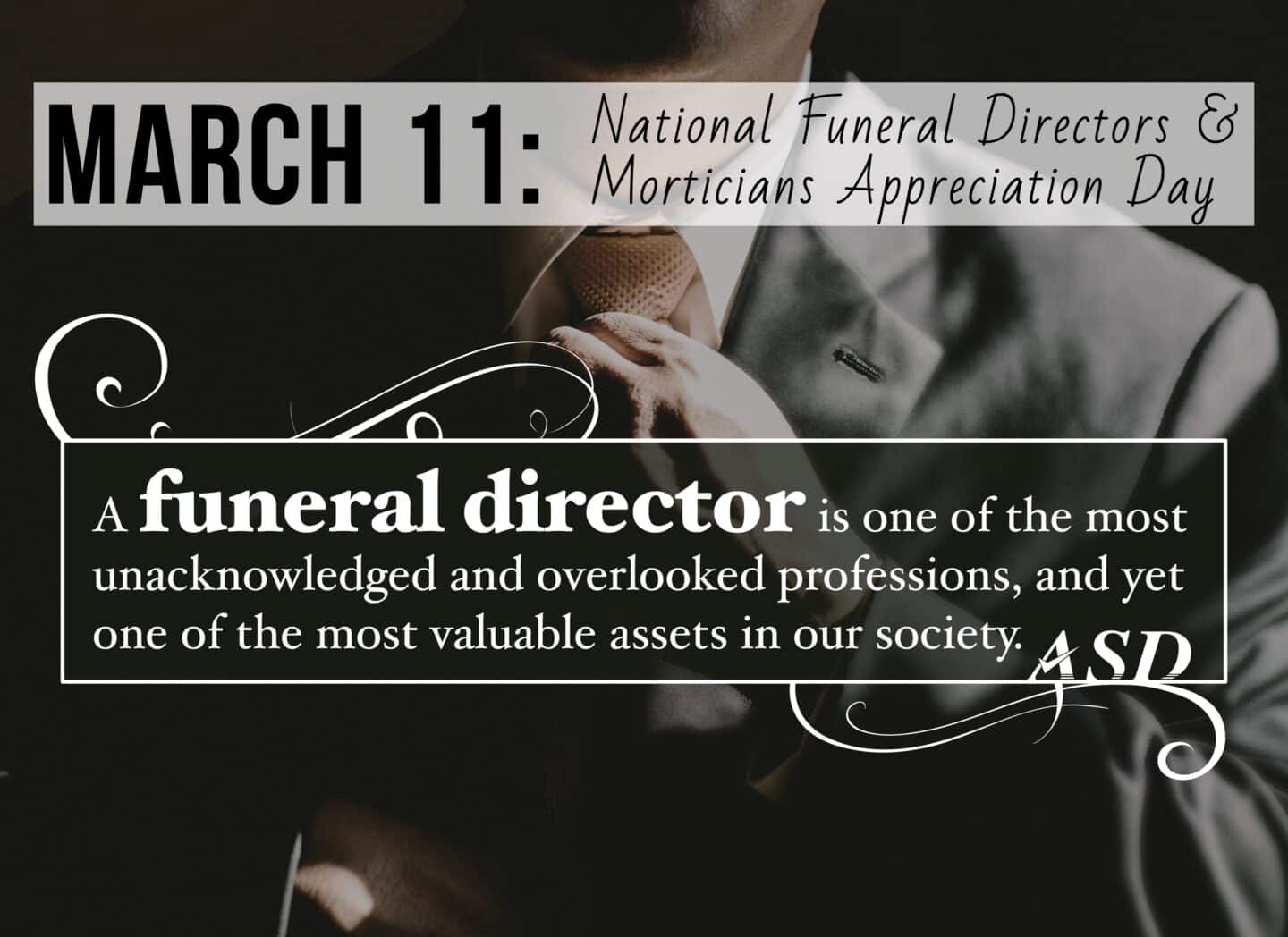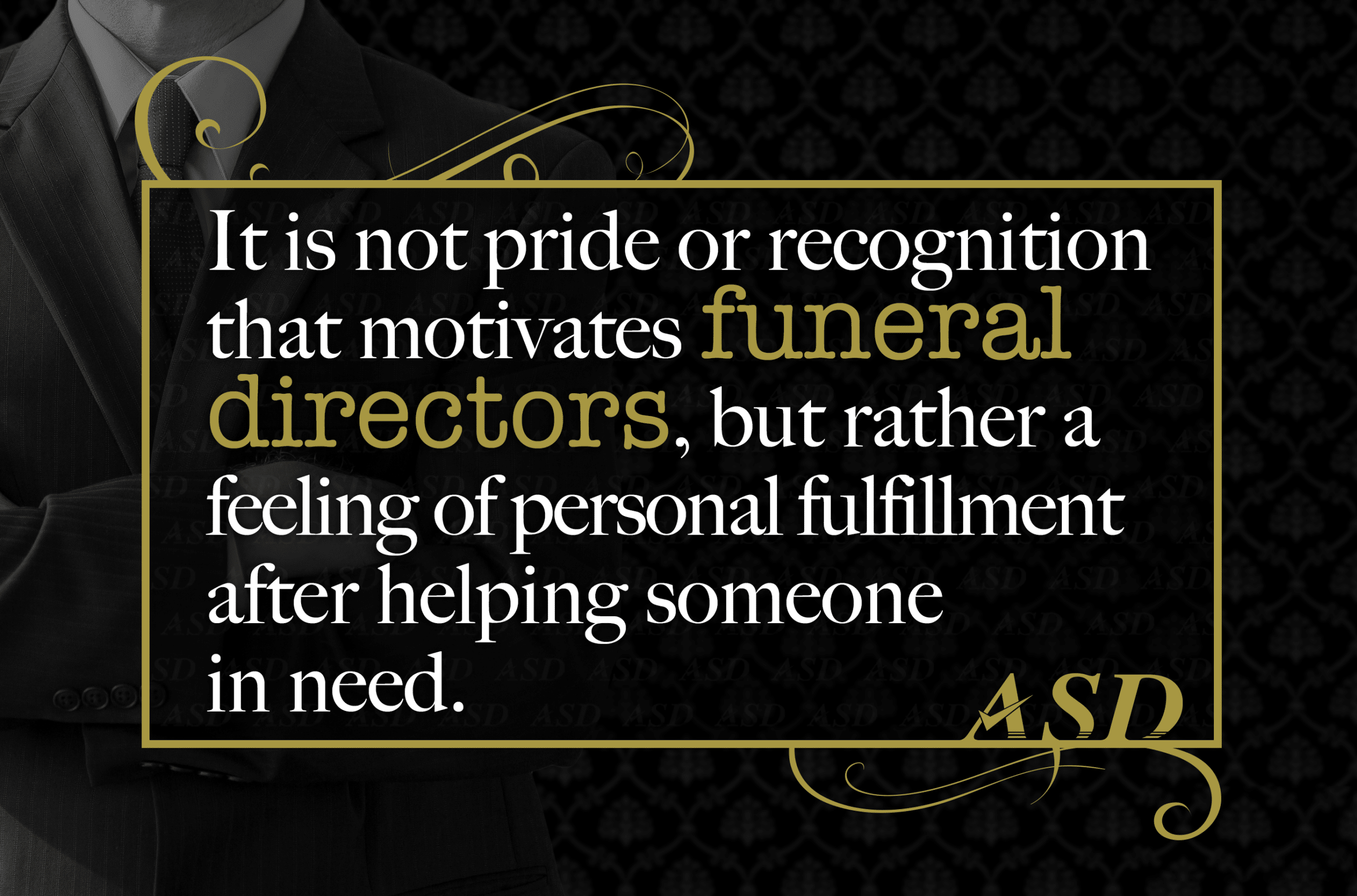
“Whereas these special men and women see their chosen profession as a higher calling, a sacred trust, in serving every family regardless of social standing, financial means, or time of day or day of the year, whenever a death occurs; and whereas March 11 would be an appropriate day to designate as National Funeral Director and Mortician Recognition Day to pay tribute to these funeral directors and morticians who, day in and day out, assist our Nation’s families in their times of sadness and grief and help families mourn a death and celebrate a life.” – H. RES. 892, passed by the 110th Congress of the United States.
On March 11, 2008, the 110th Congress of the United States passed a resolution designating March 11 as National Funeral Director and Recognition Day. This is a day to acknowledge the important work of funeral professionals and express support. Many people outside of the profession are unaware of the many ways funeral professionals devote themselves to others.
ASD regularly shares Funeral Director Facts on social media to help educate others about the dedication of directors. Each fact focuses on a different way funeral directors go beyond the call of duty to serve families. The series was created to give directors an opportunity to share information about their profession and help more people understand the nature of funeral service work.
In honor of National Funeral Directors and Mortician’s Recognition Day, here are 30 facts about funeral directors that exemplify their commitment, dedication and hard work.
1. Unless they have planned a service for an immediate family member, most people don’t realize how much support funeral professionals provide to families before, during and after a funeral service. Directors remain available during every stage of the arrangement process. After the service is over, they provide guidance on estate documents, social security and memorial products. Some also hold grief counseling sessions, holiday remembrance services and community events to comfort those in the community affected by a loss.
2. Funeral directors must be careful listeners who think creatively. Most people don’t realize how many small details directors consider when planning a service with a family. Personal touches, like having the funeral home staff wear the deceased favorite color or flower, are often added by the director without the family even having to ask. Thinking outside the box while paying close attention to the family’s wishes and memories of their departed loved one allow funeral directors to plan a truly personalized service.
3. 
4. Funeral directors must carry an inner strength in order to guide families through the toughest times of their lives. However, they also must possess robust physical strength in order to handle more labor-intensive tasks. Most people aren’t aware that a high percentage of funeral directors suffer from back issues. Too often, directors will put the needs of the family above their own safety. As a result, funeral professionals sometimes injure their backs when moving or repositioning the deceased all in an effort to alleviate some of the stress family members are feeling.
5. Funeral directors are tasked with assisting families who are often reacting to events with extreme emotions. Family members often disagree over how a loved one’s services should be handled. Most people don’t know that Funeral Directors are often forced to step in and mediate when this occurs. A dispute among relatives can delay services and make a painful situation even more difficult for family members. For this reason, directors will often act much like a family counselor to ensure everyone’s wishes and feelings are heard. Helping loved ones compromise and work together can make all the difference when it comes to planning a meaningful ceremony in such a short time period.
6. 
7. On a daily basis, funeral directors must deal with economic, operational and emotional stress, as well as the demands of providing compassion to the bereaved. Most people don’t see the emotional toll this takes on a person. Like emergency responders and hospices nurses, many directors suffer from feelings of compassion fatigue because they focus so much energy on the needs of others. The hectic and unpredictable schedule can make it difficult for directors to find time to carve out for personal fulfillment. Despite this, many are able to find a happy medium by sharing duties with other employees, using technology to streamline tasks, and finding hobbies that are in sync with their work and schedule.
8. Even after completing mortuary science degree programs and internships, funeral directors never stop learning. Most people don’t know that funeral professionals are required to take continuing education classes to keep their license active. Directors attend conventions and seminars to learn new approaches and technical advancements in their field. They will often pick up insightful tips and bring home information to enhance services at their funeral home. Even the most experienced directors will find time in their busy schedules to continue their education.
9. 
10. Most people don’t realize the lengths funeral directors go to in order to provide support to families at all times. When a significant loss is felt in the community, others can break down and display their feelings of grief outwardly. However, funeral directors must always be the steady hand in public and will continually put the needs of others ahead of their own. In many towns, a local funeral directors’ association allows directors to meet together and gain support from their colleagues who understand the unique challenges of funeral work.
11. Most people don’t realize how much support and time funeral directors dedicate to their communities. Directors meet with families where and when it is most convenient for them. They often make home visits to help the elderly set up prearrangements in a comfortable location. They also help families after hours and on holidays after a passing, often sacrificing their own personal and family time to remain available to the community 24/7.
12. 
13. Most people don’t know that funeral directors have an incredibly short window of time to plan a service that memorializes and celebrates an entire life. This requires expert planning skills as well as insight into what will make the event meaningful for everyone in attendance. With such expertise, directors are often recruited to help with other functions behind the scenes. Weddings, charity runs, movie nights and tours are just some of the ways funeral directors get involved with their community while utilizing their exceptional planning skills. Many will also host events and seminars specifically for senior citizens to help them find resources or connect with other seniors.
14. There have been many achievements throughout our history made by funeral professionals. From mayors to governors to federally elected officials, there are countless examples of funeral directors influencing positive change through politics. Many are familiar with the outstanding poetry and essays by award-winning writer and funeral director, Thomas Lynch. Others have read about funeral director Almon Stowger, who invented the first automatic telephone in 1888. However, most people overlook the extraordinary work by their local funeral directors. Every day heroes like Brian Bernardo of J.J. Duffy Funeral Home, who volunteers for his local fire department, and Richard Traunero of Traunero Funeral Home, who flies shelter animals to permanent homes, make the world a better place.
15. 
16. Most people don’t know that the funeral profession is one of the few vocations where employees’ ages can range from 18 to 80. Many became involved with the business as children, pitching in to help out with odd jobs from a very early age. The family dynamic of funeral homes often requires older and younger generations to compromise to work together harmoniously. The most successful family funeral homes are able to collaborate and blend tradition with fresh ideas. While younger funeral professionals can teach older directors how to adopt new technology to streamline business, older directors are able to show younger generations the value of offering families a personal approach.
17. Most people don’t know that a funeral director revolutionized the telephone industry. In 1888, Undertaker, Almon Strowger, realized that his competitor’s wife, a switchboard operator, was intercepting his funeral home’s phone calls. Rather than take this lying down, Almon created a solution, resulting in the first automatic telephone and the second greatest landmark in the history of telecommunications. Even in 1888, funeral professionals recognized the need to protect their firm’s sensitive phone calls.
18. 
19. Most people don’t know how vital it is for funeral directors to have a strong support system behind them. Behind these hardworking and empathetic professionals are the often-overlooked wives and husbands who provide the support, reassurance and understanding to help their spouses serve families from their community. A large majority of funeral homes are family-run establishments, requiring funeral families to be flexible and adaptable to unpredictable events. For this reason, there tends to be a very strong team-oriented environment at funeral homes.
20. Most people don’t realize how often funeral directors go out of their way to accommodate special requests and even unorthodox demands from family members. Many funeral directors have traveled outside in dangerous weather conditions because a family could not reschedule their loved one’s service. When families are extremely distressed, it is not uncommon for them to change their minds about the location of the service, the time of the funeral or even the method of disposition. In other cases, a family dispute will put the funeral director directly in the middle of two grieving relatives. These are just several examples of the many variables that often affect funeral professionals. Even when things are out of their control, funeral directors are especially skilled at adapting to challenging circumstances in order to create a meaningful funeral service.
21. 
22. Most people don’t realize the full scope of duties funeral professionals must perform. Apart from meeting with families to make arrangements and conducting services, there are a myriad of different tasks funeral directors must prioritize. Coordinating with donor agencies, casket companies, doctors, clergy members, newspapers, florists, printing companies as well as countless other organizations and vendors requires a great deal of communication and organizational skills. In addition to all of this, funeral directors must always maintain complete composure and rarely reveal stress, so it may be difficult for most people to fully conceive just devoted funeral professionals are to their work.
23. When it is time for a funeral home to change ownership, it is very rare for a stranger or outsider to take control of the business. Most people don’t realize how much thought and deliberation goes into a funeral director’s succession planning. Even when it is time to retire, directors give careful consideration to how decisions may affect the families in their communities in the future. Deciding who to entrust with the business’s name, which is often the same as the owner’s, and reputation is a major decision funeral professionals must reflect on for a great deal of time. Whether teaching their children about the funeral business from a young age or offering an apprenticeship to a mortuary science graduate, directors care very deeply about preserving the funeral home’s traditions for generations to come.
24. 
25. In our culture’s Media and Entertainment industries, the image of a funeral director is most typically an older gentleman. Most people don’t realize that roughly 57% of Mortuary Science programs are seeing more women enrollees nationwide (American Board of Funeral Service Education). Events and associations such NFDA’s Professional Women’s Conference, 100 Black Women of Funeral Service and the Association of Women Funeral Professionals now exist to empower and support female funeral directors.
26. Most people don’t realize how many sacrifices funeral directors make to remain available to their communities. On major holidays when the rest of the country is celebrating, funeral directors are often meeting with families or transporting remains after a passing. They miss milestone events and give up time with their own families to handle business, day or night. Staying connected to those in need 24/7, 365 days a year requires a selfless attitude and a strong commitment to helping others that should be commended.
27. 
28. There is a great deal of stress involved with being a funeral director. Most people don’t realize how many sacrifices directors make on a daily basis. An article released by Erie Insurance recently ranked Funeral Directors as one of “America’s Most Demanding Jobs.” This is because directors must summon both physical strength and emotional fortitude at all hours of the day. For these reasons, only those with a true calling for service and strong dedication become experienced funeral directors.
29. Funeral directors are helping families memorialize their loved one in new and interesting ways. Most people aren’t aware how many options exist for personalizing a loved one’s funeral. Directors help families create special elements for their loved one’s service from memories, talents and important life events. From providing a memorial tree or plant at a service for someone who loved the outdoors to creating a travel board that displays all the different places a person visited in their lives, there is no shortage of creative ideas within the funeral profession. By taking time to learn about the person’s life and legacy, directors have helped families to pay tribute to their loved ones in truly inspired ways.
30. Most people don’t know what to say when they first call a funeral home. One of the most common phrases funeral directors will hear is, “I’ve never had to do this before. I don’t know what to do.” While there are numerous guides to planning a wedding or anniversary celebration, there are very few resources that exist for those planning a service for the first time. This is where the experience and dedication of funeral directors shines through. Directors will make time for families with questions 24/7. They will provide detailed information on all of the different options that exist and help families to make informed choices. By offering counseling and providing expertise any time, day or night, directors guide families through making some of the most difficult decisions of their lives.

SHARE THIS POST TO SHOW YOUR SUPPORT FOR THE FUNERAL SERVICE PROFESSION


